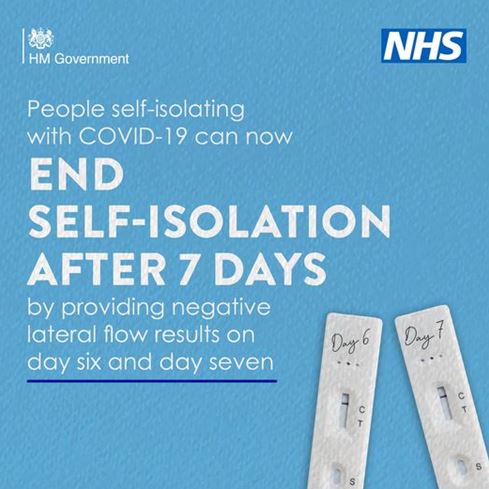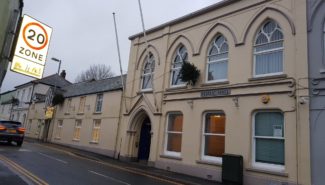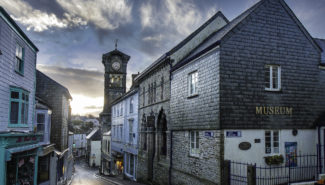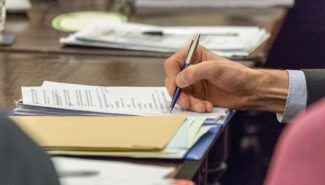Some guidance surrounding Covid-19 has changed over the past few weeks.
Shorter self isolation if you have a negative test on two consecutive days from days six onward:
If you’ve tested positive for Covid you can now end self-isolation after seven days by providing negative lateral flow results on two consecutive days from days six and seven.
- This new guidance about only needing an LFD test to confirm you as a case applies to everyone, regardless of vaccination status.
But, there are some other considerations you should be aware of:
- People who are not vaccinated must still isolate for the full 10 days if they are a contact of a positive case
- You can’t end your isolation if you still have a high temperature, even after 10 days
- If you do stop isolating after seven days please try to limit contact with vulnerable people, avoid crowded or unventilated areas if possible, and work from home if you can.
The need to get a confirmatory PCR has changed.
From Tuesday 11 February if you have no symptoms but test positive on an LFD you no longer the need to get a confirmatory PCR. Instead, you should isolate for 10 days BUT you can leave self-isolation early if:
- You have no symptoms AND,
- you have two consecutive negative LFD tests on day six and seven, or days seven and eight etc.
Further information is available here .

And, the ‘Be responsible. Be respectful’ info regarding face coverings remains:
The public and staff in public facing areas will be required to wear face coverings in these settings from 4am on 30 November 2021:
- shops and supermarkets (places that offer goods or services for retail sale or hire)
- shopping centres (malls and indoor markets)
- auction houses
- post offices, banks, building societies, credit unions, short-term loan providers, savings clubs and money service businesses
- estate and letting agents
- premises providing personal care and beauty treatments (barbers, hair salons, tattoo and piercing studios, nail salons and massage centres)
- pharmacies
- premises providing veterinary services
- retail galleries
- retail travel agents
- takeaways without space for consumption of food or drink on premises
- public transport (aeroplanes, trains, trams, buses, coaches and ferries), taxis and private hire vehicles
- transport hubs (airports, rail and tram stations and terminals, maritime ports and terminals, bus and coach stations and terminals)
- any car or small van during a professionally delivered driving lesson and practical driving test
- during all HGV lessons and tests, during all professional driving lessons and formal driving tests, and during any practical test for giving driving instruction
Covid-19 has not gone away, but you can take measures to keep yourself and others safe. They include:
- Let fresh air in if you meet indoors. Meeting outdoors is safer
- When a person infected with COVID-19 coughs, talks or breathes, they release droplets and aerosols which can be breathed in by another person. Meeting outdoors vastly reduces the risk of airborne transmission, but this may not always be possible. If you’re indoors, you should let fresh air in to reduce the risk of catching or spreading COVID-19.
- The more fresh air you let into your home or other enclosed spaces, the less likely a person is to inhale infectious particles.
- You can let in fresh air by uncovering vents and opening doors and windows. Opening your windows for just 10 minutes, or a small amount of time continuously where you can, makes a significant difference. This is particularly important before, during and after meeting people you do not live with indoors.
- Do not prop fire doors open. If you have an extractor fan at home, for example in your bathroom or kitchen, think about leaving it running for longer than usual with the door closed after someone has used the room. If you are concerned about the costs of heating, opening windows for shorter periods of time can still help to reduce the risk of the virus spreading. Wearing extra layers can help you to keep warm. You may be able to change the layout of your room so that you do not sit close to cold draughts from open windows or doors.
- Getting vaccinated – you can book a vaccination appointment online
Support is still available for those that need it
Cornwall Council’s Coronavirus Information page has information on the following:
- Business support
- Financial support
- Mental health support
- Help to get food
- Local Covid-19 data
- Changes to local services
- Testing and vaccinations
- Roadmap out of lockdown
Liskeard Town Council Update
Town Council Reception Service
The Reception is open and also available via telephone, email and in writing to 3-5 West Street, Liskeard, PL14 6BW.
Office hours are 9am to 1pm Monday to Friday
01579 345407, option 1.
reception@liskeard.gov.uk

Public Hall
The Public Hall is open for bookings. We ask that you wear a mask when entering the building.
For all booking enquiries, please ring 01579 559565 or email reception@liskeard.gov.uk

Museum/Tourist Information Centre
The Museum and Tourist Information Centre in Pike Street are now open
Monday to Friday – 10am to 4pm (closed 12.30 to 1pm for lunch)
Saturday – 10am to 1pm
Closed Sundays and Bank Holidays
Museum – 01579 346087
contact@liskeardmuseum.co.uk
TIC – 01579 349148
tourism@liskeard.gov.uk

Meetings
The Town Council meetings are now being held in person again. Agendas for meetings will be placed online the week before the meeting on the Committees page. Should anyone wish to comment on an item or attend the meeting please email the clerk of the relevant meeting as per the Committee page.


